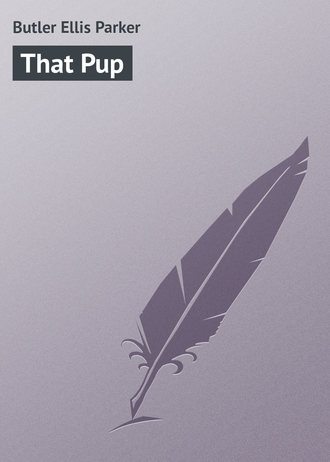
Butler Ellis Parker
That Pup
II. GETTING RID OF FLUFF
So after that Murchison decided to get rid of Fluff. He told me that he had never really-wanted a dog, anyway, but that when a dog is sent, all the way from New York, anonymously, with $2.80 charges paid, it is hard to cast the dog out into the cold world without giving it a trial. So Murchison tried the dog for a few more years, and at last he decided he would have to get rid of him. He came over and spoke to me about it, because I had just moved in next door.
“Do you like dogs?” he asked, and that was the first word of conversation I ever had with Murchison. I told him frankly that I did not like dogs, and that my wife did not like them, and Murchison seemed more pleased than if I had offered him a thousand dollars.
“Now, I am glad of that,” he said, “for Mrs. Murchison and I hate dogs. If you do not like dogs, I will get rid of Fluff. I made up my mind several years ago to get rid of Fluff, but when I heard you were going to move into this house, I decided not to get rid of him until I knew whether you liked dogs or not. I told Mrs. Murchison that if we got rid of Fluff before you came, and then found that you loved dogs and owned one, you might take our getting rid of Fluff as a hint that your dog was distasteful to us, and it might hurt your feelings. And Mrs. Murchison said that if you had a dog, your dog might feel lonely in a strange place and might like to have Fluff to play with until your dog got used to the neighborhood. So we did not get rid of him; but if you do not like dogs we will get rid of him right away.”
I told Murchison that I saw he was the kind of a neighbor a man liked to have, and that it was kind of him to offer to get rid of Fluff, but that he mustn’t do so just on our account.
I said that if he wanted to keep the dog, he had better do so.
“Now, that is kind of you,” said Murchison, “but we would really rather get rid of him. I decided several years ago that I would get rid of him, but Brownlee likes dogs, and took an interest in Fluff, and wanted to make a bird dog of him, so we kept Fluff for his sake. But now Brownlee is tired of making a bird dog of him. He says Fluff is too strong to make a good bird dog, and not strong enough to rent out as a horse, and he is willing I should get rid of him. He says he is anxious for me to get rid of him as soon as I can.”
When I saw Fluff I agreed with Brownlee. At the first glance I saw that Fluff was a failure as a dog, and that to make a good camel he needed a shorter neck and more hump, but he had the general appearance of an amateur camel. He looked as if some one who had never seen a dog, but had heard of one, had started out to make a dog, and got to thinking of a camel every once in a while, and had tried to show me Fluff that day worked in parts of what he thought a camel was like with what he thought a dog was like, and then – when the job was about done – had decided it was a failure, and had just finished it up any way, sticking on the meanest and cheapest hair he could find, and getting most of it on wrong side to.
But the cheap hair did not matter much. Murchison and Brownlee showed me the place where Fluff had worn most of it off the ridge pole of his back crawling under the porch. He tried to show me Fluff that day, but it was so dark under the porch that I could not tell which was Fluff and which was simply underneathness of porch. But from what Brownlee told me that day, I knew that Fluff had suffered a permanent dislocation of the spirits. He told me he had taken Fluff out to make a duck dog of him, and that all the duck Fluff was interested in was to duck when he saw a gun, and that after he had heard a gun fired once or twice he had become sad and dejected, and had acquired a permanently ingrowing tail, and an expression of face like a coyote, but more mournful. He had acquired a habit of carrying his head down and forward, as if he was about to lay it on the headsman’s block, and knew he deserved that and more, and the sooner it was over the better. He couldn’t even scratch fleas correctly. Brownlee said that when he met a flea in the road he would not even go around it, but would stoop down like a camel to let the flea get aboard. He was that kind of a dog. He was the most discouraged dog I ever knew.
The next day I was putting down the carpet in the back bedroom, when in came Murchison.
“I came over to speak to you about Fluff,” he said. “I am afraid he must have annoyed you last night. I suppose you heard him howl?”
“Yes, Murchison,” I said, “I did hear him. I never knew a dog could howl so loud and long as that. He must have been very ill.”
“Oh, no!” said Murchison cheerfully. “That is the way he always howls. That is one of the reasons I have decided to get rid of Fluff. But it is a great deal worse for us than it is for you. The air inlet of our furnace is at the side of the house just where Fluff puts his head when he howls, and the register in our room is right at the head of our bed. So his howl goes in at the inlet and down through the furnace and up the furnace pipes, and is delivered right in our room, just as clear and strong as if he was in the room. That is one reason I have fully decided to get rid of Fluff. It would not be so bad if we had only one register in our house, but we have ten, and when Fluff howls, his voice is delivered by all ten registers, so it is just as if we had ten Fluffs in the house at one time. And ten howls like Fluff’s are too much. Even Brownlee says so.” I told Murchison that I agreed with Brownlee perfectly. Fluff had a bad howl. It sounded as if Cruel Fate, with spikes in his shoes, had stepped on Fluff’s inmost soul, and then jogged up and down on the tenderest spot, and Fluff was trying to reproduce his feelings in vocal exercises. It sounded like a cheap phonograph giving a symphony in the key of woe minor, with a megaphone attachment and bad places in the record. Judging by his voice, the machine needed a new needle. But the megaphone attachment was all right.
Brownlee – who knows all about dogs – said that he knew what was the matter with Fluff. He said Fluff had a very high-grade musical temperament, and that he longed to be the Caruso of dogs. He said that he could see that all through his bright and hopeful puppyhood he had looked forward to being a great singer, with a Wagner repertoire and tremolo stops in his song organ, and that he had early set his aim at perfection. He said Fluff was that kind of a dog, and that when he saw what his voice had turned out to be he was dissatisfied, and became morbid. He said that any dog that had a voice like Fluff’s had a right to be dissatisfied with it – he would be dissatisfied himself with that voice. He said he did not wonder that Fluff slunk around all day, feeling he was no good on earth, and that he could understand that when night came and everything was still, so that Fluff could judge of the purity of his tonal quality better, he would pull out his voice, and tune it up and look it over and try it again, hoping it had improved since he tried it last. Brownlee said it never had improved, and that was what made Fluff’s howl so mournful – it was full of tears. He said Fluff would go to G flat and B flat and D flat, and so on until he struck a note he felt he was pretty good at, and then he would cling to that note and weep it full of tears.
He asked Murchison if he hadn’t noticed that the howl was sort of damp and salty from the tears, but Murchison said he hadn’t noticed the dampness. He said it probably got dried out of the howl before it readied him, coming through the furnace. Then Brownlee said that if there was only some way of regulating Fluff, so that he could be turned on and off, Murchison would have a fortune in him: he could turn his howl off when people wanted to be cheerful, and then, when a time of great national woe occurred, Murchison could turn Fluff on and set him going. He said he never heard anything in his life that came so near expressing in sound a great national woe as Fluff’s howl did. He said Fluff might lack finish in tonal quality, but that in woe quality he was a master: he was stuffed so full of woe quality that it oozed out of his pores. He said he always thought what a pity it was for dogs like Fluff that people preferred cheerful songs like “Annie Rooney” and “Waltz me around again, Willie” to the nobler woe operas. He said he had tried to like good music himself, but it was no use: whenever he heard Fluff sing, he felt that Murchison ought to get rid of Fluff. Then Murchison said that was just what he was going to do. What he wanted to talk about was how to get rid of Fluff.
But I am getting too far ahead of my story. Whenever I get to talking about the howl of Fluff, I find I wander on for hours at a time.
It takes hours of talk to explain just what a mean howl Fluff had.
But as I was saying, Murchison came over while I was putting down the carpet in my back bedroom, and told me he had fully decided to get rid of Fluff.
“I have fully decided to get rid of him,” he said, “and the only thing that bothers me is how to get rid of him.”
“Give him away,” I suggested.
“That’s a good idea!” said Murchison gratefully. “That’s the very idea that occurred to me when I first thought of getting rid of Fluff. It is an idea that just matches Fluff all over. That is just the kind of dog Fluff is. If ever a dog was made to give away, Fluff was made for it. The more I think about him and look at him and study him, the surer I am that the only thing he is good for is to give away.”
Then he shook his head and sighed.
“The only trouble,” he said, “is that Fluff is the give-away kind of dog. That is the only kind you can’t give away. There is only one time of the year that a person can make presents of things that are good for nothing but to give away, and that is at Christmas. Now, I might – ”
“Murchison,” I said, laying my tack hammer on the floor and standing up, “you don’t mean to keep that infernal, howling beast until Christmas, do you? If you do, I shall stop putting down this carpet. I shall pull out the tacks that are already in and move elsewhere. Why, this is only the first of May, and if I have to sleep – if I have to keep awake every night and listen to that animated foghorn drag his raw soul over the teeth of a rusty harrow – I shall go crazy. Can’t you think of some one that is going to have a birthday sooner than that?”






